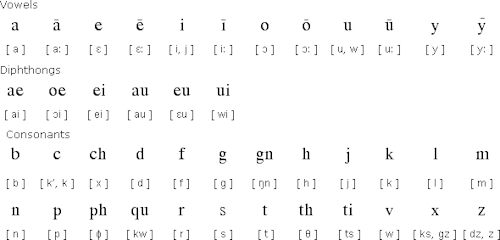CLARIFICATION: A colleague read the post below and astutely pointed out that it could be interpreted that I am not willing to perform using regional Latin or period regional Latin. That is not my intention or meaning. I have no qualms with commonly used German Latin or French Latin as diction choices, and I am certainly willing to perform in any language or diction style; what I am questioning as a matter of debate is the practicality of period regional Latin diction. Read below and please add your comments!
***
If you’re a classical singer, you’ve likely sat through some sort of diction class or coaching. It might have dealt with how to pronounce Italian, German or French. Why have you spent time on learning how to pronounce the languages you sing in? The answer is simple: you want to sing in a way that would make your declamation as clear as possible to a speaker of that native language. A side effect of learning good diction is that you learn more about the tone and cadence of that language and gain a greater appreciation for poetry and style.
So what happens if you’re singing in a language that no one speaks, such as Latin?

If you’ve sung in a choir, you’ve likely had to sing in Latin. You probably learned how to pronounce Latin by imitating the sounds produced by those around you. Eventually it becomes ingrained in your head and you pretty much know how to pronounce Latin.
Sometimes, you might have needed to vary the pronunciation of your Latin to fit something called “German Latin” or “French Latin.” In the case of the more common German Latin, this might typically involve changing the /tʃ/ to a /ts/ in the case of a written ‘c’. The reason for this? It could have been the way that the composer expected the Latin to sound at the time he published his work.
Why the variation? Before the 20th century, regional differences in Latin were common. An English singer might pronounce Latin differently from a Dutch singer, who in turn pronounced differently from an Italian singer. Because of the Catholic Church’s position in Rome, the Italian dialect of Latin became a default for many. In 1903 Pope Pius X issued a Motu Proprio firming up the ascendancy of Latin as the church’s language. This established the Italian pronunciation as the orthodox option. Thus, musicians will generally interpret pieces in Latin written after 1903 with the “standard” or Italian pronunciation.
But what do you do about music written before 1903, you ask? Often times you use one of the German or French options of Latin if the composer came from a German or French speaking country. Wikipedia has a good summary of the various regional modern Latin sounds in different European regions. It gets trickier the farther back in time you go, however. Just because Latin might have been pronounced in one way in, say, Paris in 1850, it doesn’t mean it was pronounced the same way in Paris in 1500, when Antoine Brumel was working at the Cathedral of Notre Dame. What about Brumel’s contemporary Josquin, who hailed from the Low Countries, but spent much of his career in Italy? How might he have wanted Latin pronounced?
Scholars have tried to answer these questions. One quite thorough study is by Timothy James McGee, A. G. Rigg, David N. Klausner and is called Singing Early Music: The Pronunciation of European Languages in the Late Middle Ages and Renaissance. It attempts to give a phonetic key to various periods in different European regions so that singers can apply these phonetics to specific texts. It must have been a massive undertaking to figure out these phonetic rules and then describe them in a coherent way. Another prolific scholar in this field is Alison Wray, whose research ranges from historical linguistics for singers to psycholinguistic theory. Her chapter, “The Sound of Latin in England Before and After the Reformation” from English Choral Practice: 1400-1650 gives specific insight into period Latin pronunciation as indicated from historical texts that were used mainly to teach Latin to scholars.

Above is just one of many Latin pronunciation charts you can find on line.
My ensemble New York Polyphony consulted Alison Wray on period diction when we were preparing William Byrd’s Mass for Four Voices, Thomas Tallis’ Mass for Four Voices, and John Plummer’s Missa sine nomine, all of which ended up on our CD Times Go By Turns,for which we received a GRAMMY nomination. After adding Wray’s pronunciations to our music using the international phonetic alphabet (IPA), we rehearsed. It didn’t take us long to realize two things about this process: 1.) Period English Latin sounds alien to our ears, and 2.) it would take a lot of time and effort to make all the Latin words sound fluent and compelling within the musical framework that the composers provide. Ultimately, we agreed that period diction would be a distraction from the music, and would also be a risky musicological approach for us to take, seeing as none of us are musicologists or linguistics experts.
So, should you do period Latin diction the next time you sing a concert of early music? Here’s what I think: NO. I have extreme respect for the well-devised and impressively constructed systems of phonetics developed by scholars like McGee, Rigg, Klausner and Wray. However, these systems are ultimately very educated historical linguistic guesses. Even when you use one of these systems, you’re unlikely to have the time to get everyone in your choir or ensemble on the same page with regards to IPA and pronunciation. Every minute you spend on pronunciation becomes one less minute spent on musical preparation.

If you want a compromise, come up with a few small rules to flavor the language in a way that hints at the regionalization you want. Start with one of the three main choices: Italian, German or French latin, and then add a few more rules within reason. For example, if you want a period English flavor, change your /tʃ/ to /s/ in the case of the word “caeli”. Or for period Franco-Flemish, change your /u/ to /Y/. By applying a few general and simple rules, you achieve a feeling of the period regionalization without contorting yourself into historical linguistic guess work.
(NB: My opinions are different regarding to the commonly used 19th century German and French varieties of Latin diction. There much more evidence — including recordings — to support these choices, and many singers can shift into these systems of diction with ease.)